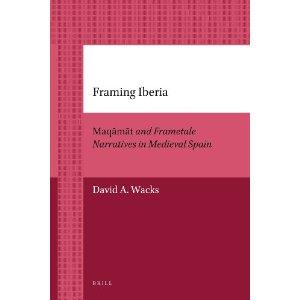Framing Iberia. Maqāmāt and Frametale Narratives in Medieval Spain
CODICE: ISBN 9004205896 EAN 9789004205895
AUTORE/CURATORE/ARTISTA :
Author: David Wacks
EDITORE/PRODUTTORE : Brill
COLLANA/SERIE : Brill’s Paperback Collection
DISPONIBILITA': In esaurimento
TITOLO/DENOMINAZIONE:
Framing Iberia. Maqāmāt and Frametale Narratives in Medieval Spain
PREZZO : EUR 49,50€
CODICE :
ISBN 9004205896
EAN 9789004205895
AUTORE/CURATORE/ARTISTA :
Author: David Wacks
EDITORE/PRODUTTORE:
Brill
COLLANA/SERIE:
Brill’s Paperback Collection
ANNO:
2011
DISPONIBILITA':
In esaurimento
CARATTERISTICHE TECNICHE:
280 pages
Paperback
DESCRIZIONE:
Publisher's description:
Framing Iberia is a study of medieval Iberian culture observed through the lens of the frametale, a type of story collection cultivated by medieval Iberian authors in several languages. Its best known examples outside of Iberia are Chaucer’s Canterbury Tales, Boccaccio’s Decameron, and the Thousand and One Nights. In Framing Iberia the author relocates the Castilian classics El Conde Lucanor and El Libro de buen amor within a literary tradition that includes works in Arabic, Hebrew, Latin, and Romance. In doing so, he draws on current critical theory and cultural studies in reevaluating how the multicultural society of medieval Iberia is reflected in its narrative literature. Winner of the 2009 La corónica International Book Award for scholarship in Medieval Hispanic Languages, Literatures, and Cultures.
“...By presenting the various points of the frame-tale tradition in Iberia as revolving parts of a literature unified through genre and form, Wacks has succeeded in creating a capacious frame for analyzing this manifold tradition that will prove foundational for twenty-first century scholars and their students, including my own...”
The Medieval Review, 5 September 2008, Ryan Szpiech
“…In this book David Wacks has written one of the most complete studies of medieval framed narrative in" Iberia to date. Wacks brings to bear his expertise in Latin, Arabic, Hebrew, Catalan, and Castilian to demonstrate that the frame tale and maqāma form an essentially Iberian genre produced over a period of four centuries in a cultural polysystem that synthesized literary practices from Muslim, Jewish, and Christian communities. Furthermore, Wacks contends that the origins of the European frame tale can be traced to the Iberian Peninsula, and he contextualizes his chapters within a larger European literary history. Framing Iberia will be an important and reliable reference for scholars working on the short story and frame tale in general, beyond the boundaries of medieval Iberia… As a book that has that worldview at the center of its thesis, Framing Iberia is both a comprehensive study of the frame tale and a sensitive cultural history of Spain…”
Speculum 83.4 (2008): pp. 1052-53, Jonathan Burgoyne
Table of contents:
IX Acknowledgements ..
XIII Transliteration of Arabic
XV Transliteration of Hebrew
1 Introduction
17 Chapter One: Writing Across the Frontier
41 Chapter Two: Storytelling and Performance in Medieval Iberian Frametale and Maqāma
86 Chapter Th ree: Th e Cultural Context of the Translation of Calila e Dimna
129 Chapter Four: Reconquest Ideology and Andalusī Narrative Practice in the Conde Lucanor
157 Chapter Five: Th e Libro de buen amor and the Medieval Iberian Maqāma
194 Chapter Six: Social Change, Misogyny, and the Maqāma in Jaume Roig’s Spill
237 Works Cited
265 Index
GENERE: Libri ,Saggi ,



